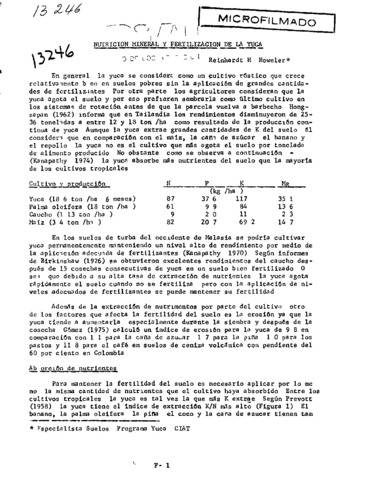Nutricion mineral y fertilizacion de la yuca
Although cassava grows relatively well in unfertile acid soils where many crops do not prosper, it also responds to fcrtilization and, in fact, has a fairly high P requirement. In general P is the most limiting element for yields in 3 classes of tropical soil; in the Llanos Orientales of Colombia, yields are tripled by adequate P fertilization. Cassava extracts large quantities of K from the soil (approx 100 kg of K2O/25 t of roots) and this element can be exhausted if cassava is continuously cultivated without returning appropriate quantities of K to the soil. Under these conditions the crop responds to high rates of K. In comparison to other crops, cassava requires equal to or less than N, and generally, only low levels are recommended since the excessive application of N fertilizers stimulates the growth of foliage and reduces starch synthesis. Cassava tolerates acid soils where other crops suffer from Al or Mn toxicity fairly well. It also tolerates a low pH, even when the optimum pH for this crop varies from 5.5-7.5. Cassava responds to low rates of K but is susceptible to excess timing, which can cause minor element deficiencies. Among the minor element deficiencies, Zn is the most frequent; it can be amended by applying ZnSO4 to the soil, as a foliar spray or in solution for dipping the propagation material. By selecting a great no. of cassava cv. for their tolerance to adverse soil conditions, such as acidity or a limited amount of available P, it is possible to obtain genetic material that is especially well adapted to develop in poor soils with a min of fertilization. (AS-CIAT)

